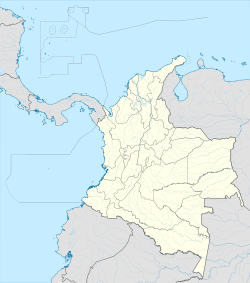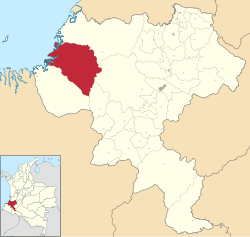Timbiquí
| Timbiquí | ||
|---|---|---|
|
Coordinates: 2 ° 46 ′ N , 77 ° 40 ′ W Timbiquí on the map of Colombia
|
||
|
Location of the municipality of Timbiquí on the map of Cauca
|
||
| Basic data | ||
| Country | Colombia | |
| Department | Cauca | |
| City foundation | 1535 | |
| Residents | 22,077 (2019) | |
| Detailed data | ||
| surface | 1813 km 2 | |
| Population density | 12 inhabitants / km 2 | |
| height | 5 m | |
| Waters | Pacific Ocean , Timbiquí | |
| City Presidency | Tito Ever Ramírez Gómez (2016–2019) | |
Timbiquí is a municipality ( municipio ) in the Colombian department of Cauca on the Timbiquí river of the same name .
geography
The municipality, which is sparsely populated with twelve residents per square kilometer, is located in the west of the department, for the most part in the lowlands with jungle and mangroves , the average height is 5 m. The main town is about 10 kilometers from the coast of the Pacific Ocean and 580 km from Popayán . Other larger rivers besides the Río Timbiquí are the Río Saija and the Río Bubuey .
The climate is tropical and humid with an annual average temperature of 28 ° C and up to 6000 mm of precipitation.
Neighboring in the north are the Municipio López de Micay , in the east the Municipios El Tambo and Argelia , in the south Guapi and in the west the Pacific.
population
The municipality of Timbiquí has 22,077 inhabitants, of which 4584 live in the urban part (cabecera municipal) of the municipality (as of 2019).
history
Timbiquí was founded in 1772 by Francisco Antonio de Mosquera, the population originally being the indigenous people of the Embera - Wanana from the area of the Río San Juan, who were brought to the region by the Spaniards for gold mining on the banks of the rivers. Later on , slaves from Africa were brought in for gold mining , from which a large part of today's population descends. Timbiquí has had parish status since 1915.
economy
The main industry in Timbiquí is agriculture . There are sugarcane , rice , bananas , coconuts and corn grown. Fishing , mining and the timber industry also play an important role.
crime
In February 2011, a 31 m long submarine made of fiberglass with a load capacity of 8 t and which was submersible to a depth of 9 m and could have reached the coast in a few days was confiscated. The production costs were estimated at 1.5 million euros. Until then, only drug submarines that could sail close to the surface of the water had been seized in Colombia .
Personalities
- Avilés Hurtado (* 1987), football player
Web links
- Alcaldía Municipal de Timbiquí - Cauca. Alcaldía de Timbiquí - Cauca, accessed on June 6, 2019 (Spanish, website of the municipality of Timbiquí).
- Panoramio aerial view of Timbiquí "City"
Individual evidence
- ↑ a b c Nuestro municipio. Alcaldía de Timbiquí– Cauca, accessed June 6, 2019 (Spanish, information on the municipality).
- ↑ ESTIMACIONES DE POBLACIÓN 1985 - 2005 Y PROYECCIONES DE POBLACIÓN 2005 - 2020 TOTAL DEPARTAMENTAL POR ÁREA. DANE, May 11, 2011, accessed on June 6, 2019 (Spanish, extrapolation of the population of Colombia (Excel; 1.72 MB)).
- ^ Colombia: Navy discovers cocaine submarine , Stuttgarter Zeitung, February 16, 2011
- ↑ Drug submarine discovered in the Colombian jungle , picture from February 15, 2011
- ↑ http://www.tagesschau.sf.tv/Nachrichten/Archiv/2011/02/15/Vermischtes/Drogen-U-Boot-mit-acht-Tonnen-Kokain

